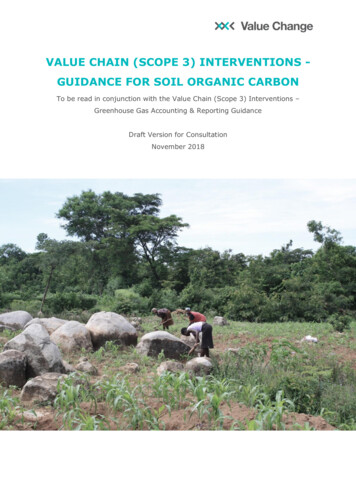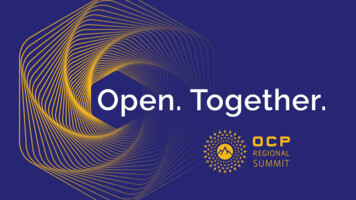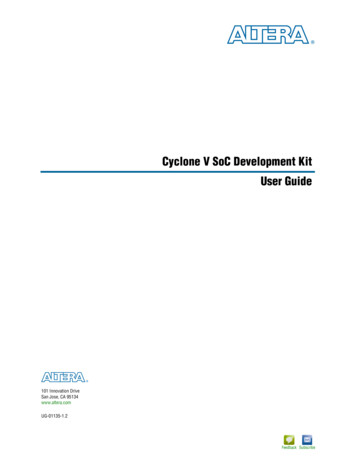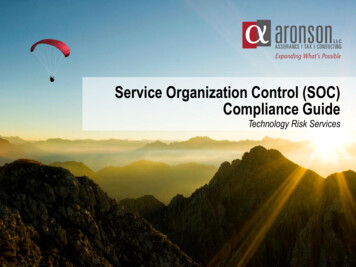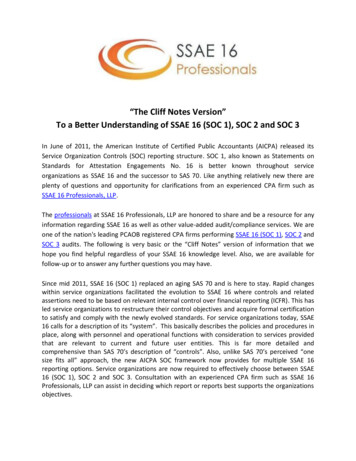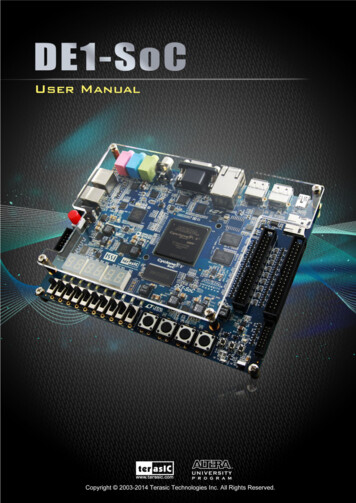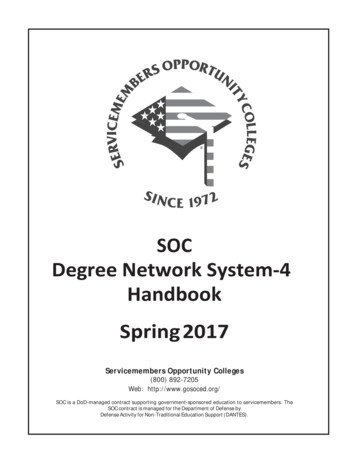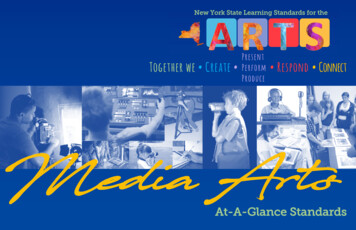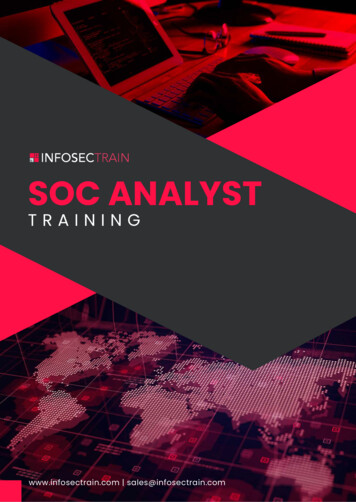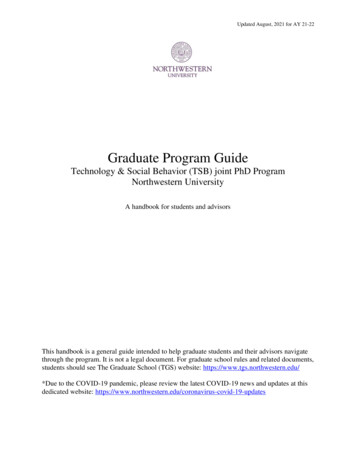
Transcription
Updated August, 2021 for AY 21-22Graduate Program GuideTechnology & Social Behavior (TSB) joint PhD ProgramNorthwestern UniversityA handbook for students and advisorsThis handbook is a general guide intended to help graduate students and their advisors navigatethrough the program. It is not a legal document. For graduate school rules and related documents,students should see The Graduate School (TGS) website: https://www.tgs.northwestern.edu/*Due to the COVID-19 pandemic, please review the latest COVID-19 news and updates at thisdedicated website: updates
Contact InformationTSB Director of Graduate StudiesAssociate Prof. Nicholas DiakopoulosFrances Searle Building, Room #2-1522240 Campus DriveEvanston, IL 60208Tel: 1 404-509-9974Fax: 1 847-467-1036Email: nad@northwestern.eduTSB Program AssistantMadeleine AgatonFrances Searle Building, Room #2-1182240 Campus DriveEvanston, IL 60208Tel: 1 847-467-3551Fax: 1 847-467-1036Email: m-agaton@northwestern.eduTSB Accounting SpecialistKasia ZieleniuchaFrances Searle Building, Room #2-1182240 Campus DriveEvanston, IL 60208Tel: 1 847-467-4664Fax: 1 847-467-1036Email: kasia@northwestern.eduTSB ListservsMailing list for TSB PhD students. Only list members and owners can post and ailing list for TSB-affiliated faculty. Only List members and owners can post and rrent list owners: nad@northwestern.edu, m-agaton@northwestern.eduWebsitesTSB PhD Program websitehttp://tsb.northwestern.edu
Students and FacultyCurrent TSB Students Mowafak Allaham, MowafakAllaham2021@u.northwestern.edu John Bandy, JohnBandy2022@u.northwestern.edu Julia Barnett, JuliaBarnett2026@u.northwestern.edu Herminio Bodon, HerminioBodon2020@ u.northwestern.edu Katya Borgos-Rodriguez, KatyaBorgos-Rodriguez2022@u.northwestern.edu Connie Chau, ConnieChau2026@u.northwestern.edu Carl Colglazier, CarlColglazer2025@u.northwestern.edu Henry Dambanemuya, HenryDambanemuya2023@u.northwestern.edu Maitraye Das, MaitrayeDas2022@u.northwestern.edu Kapil Garg, KapilGarg2017@u.northwestern.edu Zachary Gibson, ZacharyGibson2021@u.northwestern.edu Kallayah Henderson, kallayahhenderson2025@u.northwestern.edu Evey Huang, JiaxinHuang2024@u.northwestern.edu Taewook Kim, TaewookKim2026@u.northwestern.edu Harrison Kwik, HarrisonKwik2025@u.northwestern.edu Hanlin Li, HanlinLi2022@u.northwestern.edu Ryan Louie, RyanLouie2021@u.northwestern.edu Jim Maddock, StephenMaddock2021@u.northwestern.edu Leesha Maliakal, l-maliakal@northwestern.edu Ethan Manilow, EthanManilow2015@u.northwestern.edu Priyanka Nanayakkara, PriyankaNanayakkara2024@u.northwestern.edu Ada Ng, AdaNg2021@u.northwestern.edu Sachita Nishal, sachitanishal2020@u.northwestern.edu Katherine O’Toole, Katherine0aposToole2020@u.northwestern.edu Abir Saha, AbirSaha2023@u.northwestern.edu Nicole Tilly, NicoleTilly2023@u.northwestern.edu Gustavo Umbelino, GustavoUmbelino2024@u.northwestern.edu Nicholas Vincent, NicholasVincent2021@u.northwestern.edu Emily Wang, EmilyWang2021@u.northwestern.edu Yixue Wang, YixueWang2022@u.northwestern.edu Dongping Zhang, DongpingZhang2023@u.northwestern.edu Richard Zhang, RichardZhang2025@u.northwestern.eduTSB-Affiliated Faculty Nabil Alshurafa, Preventative Medicine Larry Birnbaum, Computer Science Jeremy Birnholtz, Communication Studies Pablo Boczkowski, Communication Studies Fabián Bustamante, Computer Science) Noshir Contractor, IEMS / Communication Studies / Kellogg Leslie DeChurch, Communication Studies Nicholas Diakopoulos, Communication Studies Doug Downey, Computer Science
Matthew Easterday, SESPKen Forbus, Computer ScienceSteven Franconeri, PsychologyElizabeth Gerber, Mechanical Engineering / Communication StudiesDarren Gergle, Communication StudiesKris Hammond, Computer ScienceJason Hartline, Computer ScienceBrent Hecht, Communication StudiesMichael Horn, Computer Science / SESP,Ian Horswill, Computer ScienceSid Horton, PsychologyÁgnes Horvát, Communication StudiesJessica Hullman, Computer Science / JournalismMaia Jacobs, Computer ScienceMatthew Kay, Communication Studies / Computer ScienceBarbara O’Keefe, Communication StudiesEleanor O’Rourke, Computer Science / Learning SciencesBryan Pardo, Computer ScienceChris Riesbeck, Computer ScienceMichael Roloff, Communication StudiesJames Schwoch, Communication StudiesAaron Shaw, Communication StudiesJack Tumblin, Computer ScienceEllen Wartella, Communication StudiesUri Wilensky, Computer Science / SESPMarcelo Worsley, Learning Sciences / Computer ScienceHaoqi Zhang, Computer ScienceTSB Executive Committee Noshir Contractor Nicholas Diakopoulos Darren Gergle Elizabeth Gerber Ian Horswill Bryan Pardo Chris Riesbeck
Degree RequirementsThe TSB doctoral program admits students from a variety of backgrounds and gives themrigorous training in social science, humanities, and engineering methodologies, allowing them tounderstand technological developments in their broadest possible contexts. The implementationand production of media, information and communication technology—as well as the study oftheir contexts of use—is an expected part of the program of study. Accordingly, students shouldeither have a technological background already, or be prepared to acquire the relevant skills earlyin their graduate program.To complete the Ph.D. in Technology and Social Behavior, students must complete coursework,pass qualifying examinations and prospectus, and complete a thesis as detailed below:Course RequirementsCritical evaluation of disciplinary perspectives, as well as integration of disciplinarymethodologies, is a key goal of the TSB doctoral program. The required courses thereforeprovide theoretical, historical, psychological, and sociological perspectives on technology, alongwith classes in research methods. For the remaining courses, each student must work with anadvisor to create a course of study that approaches a single theme within technology and socialbehavior from multiple disciplines.Because Ph.D. students are encouraged to create a course sequence that best supports theirresearch, dissertation, and teaching plans, each student will be assigned to a first-year advisorupon arrival, who will help design a research plan. Students need not, however, feel obliged tochoose this person as a thesis advisor. The research plan will incorporate course requirementsfrom both the School of Engineering programs and School of Communication, however sincethese degree requirements are quite flexible, students can expect to engage in hands-on researchstarting in their first year.Computer Science and MTS both have flexible course requirements, demonstrating bothdepartments’ support of independent programs. In the TSB combined degree program, 2additional units are added to the overall Ph.D. requirements: students must take qualifyingexaminations in both departments, and students must submit their Ph.D. theses to a committeecomposed of faculty from both departments.First Year RotationsIn the first year, students participate in 2 two-quarter lab rotations. One of these will be with yourfirst-year advisor and should be considered your home laboratory. The second will be with aresearch mentor with whom you would like to work closely with on a research project. The labrotations give you exposure to different styles of research and different topics, while getting youinvolved in research activities from the moment you arrive. Each lab rotation should result in apaper (hopefully to be submitted to a conference or journal). By the time you begin the quarteryou should have worked with the DGS to identify a primary advisor and, to the extent possible,identify one or two potential professors with whom you could perform a lab rotation. Pleasesubmit the details of each of your rotations using this form early in the Fall and Springquarters.
The TSB program combines the requirements of the Communication Studies and ComputerScience departments in a 20-unit curriculum that includes the following:RequirementCourse Tracking(report course number, professor, title,and quarter of completion)The MTS 501 course: “First Year Research Practicum”1.Two MTS graded courses taught by two different facultymembers2.3.The MTS 503 course: “The Practice of Scholarship”4.The MTS 519 course: “Responsible conduct of Research” 5.Two units of COMM ST 499 (rotation)6.7.Two units of COMP SCI 499 (rotation)8.9.A concentration in either the Artificial Intelligence orInterfaces track as defined by the Computer ScienceDepartment. This concentration will be composed of 4courses taken from one of those concentrations, and willdefine which qualifying exams the student takes in CS.Check with the DGS or relevant Computer Scienceprogram for course details.10.11.12.13.(Examples of acceptable courses for the Interfaces trackare Design of Interactive Learning Environments,Computer Graphics, Computer Game Design, MachineLearning, etc.)The remaining units can be taken in Computer Science,MTS or departments across the University (LearningScience, Engineering, Art & Technology, etc), includinggraded Independent Studies (e.g. 499, but not 590 sinceit’s pass/fall) in Computer Science or MTS.Note: 6 units must be 400 or 500 level.14.15.16.17.18.19.20.21.
The Graduate School of Northwestern University (TGS) has university-wide policies andregistration requirements that must be followed in addition to the TSB program requirements.Students should follow these policies as they are required in order to remain active in theprogram and to graduate. They are as follows: PhD Coursework and Registration RequirementsPhD TimelineFull-Time Study Requirement and Authorized CoursesChange of Registration PolicyContinuous Registration PolicyLanguage Courses During the Academic Year PolicyGrades and Grade RequirementsSummer RegistrationSummer registration is required for doctoral students receiving funding in the summer quarterfrom the University.Summer enrollment may also be required as a result of visa or loan status. Students shouldreview the details of their visa or loan to determine if summer registration is required. Fordetailed information regarding such policies, students are responsible for contacting theInternational Student and Scholar Services or their loan company directly. For students doing asummer internship please contact Bruce Lindvall about the Crown Family Internship, whichfacilitates registration at NU and continuity of benefits if needed.Unfunded students are not typically required to register during the summer, unless in thesituations specified above. Please review the full-time study and registration requirements.Summer enrollment for funded students is usually accomplished by registering full time for 3-4units. For example: 1st year students on a lab rotation would typically register for a 499 for 1 unit with theirrotation advisor, and then also for 2 units of MTS 590 with their rotation (or first-year)advisor, for a total of 3 units of registration; 2nd year students would register for 3 units of 590 with their current advisor; 3rd year and above students would register for TGS 500.MTS 590 is graded on a P/N/K basis (pass, no grade, in progress). Students should register in asection with their current advisor. Students must notify their advisor that they have enrolled. Atthe end of summer quarter, students must again contact their advisor and request submission of aPass or No Pass grade. The advisor will submit a grade dependent on the student’s progress.Please review the full-time study and registration requirements.Additional ProgrammingTSB students are expected to participate regularly in academic activities provided by the
program, allied departments, and University centers. Generally, such activities include: Conferences organized by program faculty or students TSB Colloquium Series co-organized by faculty and students (and strongly encouraged toattend Computer Science and MTS seminar series as well as related seminars hosted bythe Segal Design Institute, Center for Human-Computer Interaction Design, and AI @NU initiative) Professionalization workshops organized by students and conducted by faculty, seniorstudents, or others Lectures, workshops, conferences, and other scholarly activities offered by otherprograms as pertinent to the student’s intellectual developmentAdvisingThe program director helps to assign a first-year advisor to each incoming graduate student. Thegoal is to make the best pairing with a first-year advisor possible, with the intention that thiscould become a long-term advising relationship. The first-year advisor typically directs the firstlaboratory rotation and serves as the home laboratory affiliation for the first year. The first-yearadvisor also helps orient the student on coursework, research, and other relevant aspects ofgraduate education. Please enter your first-year advisor information in the Graduate StudentTracking System (GSTS). Also review the Guidance for Positive Graduate Student and FacultyAdviser Relationships and the Graduate Educations Expectations.A student can change advisors at any time during the course of graduate studies. However, thismust be a mutual decision between the student and new advisor. It may also require the newadvisor to make funding support commitments if the student does not have an externalfellowship or outside source of funding. Any member of the TSB faculty who is tenured ortenure-track may serve as an advisor.In a student-initiated change of advisors, the student is responsible for both securing theacceptance of the new advisor and communicating the change to the former advisor. Because nostudent is permitted to pursue graduate studies without guidance from an advisor, the studentmay not terminate an advising relationship until a new one is in place. Please update advisorinformation in the Graduate Student Tracking System (GSTS).An advisor can also decline to continue in the role at any time during the course of the student’sgraduate studies. If the advisor wishes to no longer serve in that role, the advisor must officiallynotify the student and Director of Graduate Studies in writing. Once official notice has takenplace, the student has one quarter to secure a new advisor. During the transition, the currentadvisor will continue to serve.A student without an active advisor is not considered in good standing and is at risk of exclusionfrom the program.Qualifying ExamsStudents in the TSB combined degree program will complete two qualifying exams, one related
to each of the constituent programs of CS and MTS.Students take the CS qualifying exam in either the Interfaces or Artificial Intelligence track. Seethe CS PhD Graduate Manual for details on the qualifying exam for each track:https://phd.cs.northwestern.edu/Students take the MTS exam in two parts, by completing one major field exam and one minorfield exam. See additional details on the qualifying exams structure in MTS:https://mts.northwestern.edu/resources/The Examination Chair (most often your advisor) will help establish the details of the exams.Scheduling of the Qualifying ExamsThe Graduate School (TGS) requires that qualifying exams must be completed no later than theend of the student's 3rd year in the program. However, the TSB requirements are morestringent and require that the Computer Science qualifier be completed no later than the end ofthe student’s 2nd year in the program, and the MTS qualifying exams be completed no laterthan the end of the student’s third year in the program.The procedures for the Computer Science qualifying exam depend on the track chosen, andstudents should work with their advisor to determine the track best suited for their research andcareer goals. For the Artificial Intelligence track, the students need to inform the director of theArtificial Intelligence division in advance that they will be sitting for the exam. This typicallytakes place near the end of Spring quarter in the second year. For the Interfaces qualifying exam,the students need to work with their advisor to form a committee of three to review a researchpaper and presentation led by the student. The committee needs to consist of at least twomembers of the Computer Science faculty and can include one member that does not have aComputer Science affiliation.The MTS qualifying exam requires two written components (one major field and one minorfield) supervised by two different members of the student’s MTS committee. The major fieldcomponent assesses whether the student is capable of doing high-quality independent researchwithin the student’s major field (i.e. the student’s core research interest). This will typically takethe form of a research paper of publishable quality. The minor field component assesses thestudent’s grasp of material in the student’s minor field (that is, an area adjacent to the student’score research interests). This exam is meant to be smaller in scale and scope than the major fieldexam (e.g, less work, shorter papers) and can take a variety of forms including a written paper,data analysis, development of a course syllabus with readings, a grant proposal, a portfolio ofengaged scholarship, and so on. The topic must be approved in advance and in consultation withthe student’s advisor.Timely completion of qualifying exams is ultimately the responsibility of the student. If notcompleted on time, the student is not considered in good standing and is at risk of exclusion fromthe program.Procedures for Revising or Retaking the Qualifying Exam
The exact procedures for retaking a qualifying exam depend on the form of the exam chosen. Fordetails of the Computer Science exams please see the Computer Science Graduate Manual.Written components of the MTS portions of the exam are typically reported as “Pass,” “Revise,”or “Fail.” A student who receives a request for revisions has no more than six weeks from receiptof the grade to submit the revision.If the student receives a “Fail,” they are permitted to retake the exam once. No part of the exammay be revised or retaken more than once.Approval processWhen exams have been successfully completed, the student is responsible for 1) uploading theexaminers’ approvals (confirmation email from each examiner to the student verifying passedexams) into the Graduate Student Tracking System (GSTS) — Documents— UploadDocuments— General and title the File “Qualifying exam approval- [Computer Science qual]or [MTS Major qual] or [MTS Minor qual]” with name (Last name, First name) and when allexams have been completed and uploaded then 2) submitting the “PhD Qualifying Exam” formavailable in the Graduate Student Tracking System (GSTS) — TGS Forms. The department willreceive an automated message with instructions to approve the student should be admitted tocandidacy. The program assistant will validate passage of the exams by reviewing the examiners’confirmations already uploaded by the student in GSTS.Prospectus DefenseTSB students must complete their dissertation prospectus, revise, and have it approved by thedissertation committee members, by no later than the end of their fourth year in the program.The prospectus is a written document that is read and reviewed by the student’s dissertationcommittee. The details of how the examination are conducted are ultimately determined by thedissertation chair (usually the student’s advisor) but require review of the document and typicallyinvolve a short presentation followed by detailed questions and examination of the prospectus bythe committee. This review may result in additional changes to the prospectus document. Once asatisfactory prospectus document is achieved, the committee members signal their approval witha vote.Once a satisfactory final prospectus is approved by the committee, the student is responsible for1) uploading the committee approvals (confirmation email from each committee member tostudent verifying passed prospectus) into the Graduate Student Tracking System (GSTS) — Documents— Upload Documents— General and title the File “Prospectus approvals” withname (Last name, First name) and then 2) submitting the prospectus form available in theGraduate Student Tracking System (GSTS)— TGS Forms. The department will receive anautomated message with instructions to approve the student’s prospectus form. The programassistant will validate passage of the written exams by reviewing the committee members’confirmations already uploaded by the student in GSTS.ThesisTheses in Computer Science are mostly composed of an implemented system, while theses inCommunication require empirical research that adduces evidence for a hypothesis. Ph.D. thesesin TSB, the combined Ph.D. in Computer Science and Communication, will comprise two parts
that are not often found together – an implementation, and a hypothesis about how theimplemented system affects social behavior, with an empirical evaluation of that hypothesis.In order to ensure that the Ph.D. thesis represents dual competence in Computer Science andCommunication, thesis committees are composed of four faculty members, of whom two are inSocial Science fields and two are in Computer Science. A minimum of three of the committeemembers, including the chair, must be members of the Northwestern University GraduateFaculty. The thesis must be judged during the thesis defense to be acceptable by all four of thesecommittee members.Thesis DefenseThe Application for Degree form in GSTS must be submitted for the quarter in which you intendto complete the PhD degree and by the TGS deadlines.Once the written thesis is completed, a final examination takes place in the form of a thesisdefense, which includes your thesis committee and is also open to the public. You should workwith your advisor and thesis committee to schedule your defense. Once scheduled, you shouldcontact the TSB Program Administrator with the title, abstract, and scheduling details of yourdefense so that it can be publicly announced. The examining committee, however, has thediscretion and will typically exclude the public during part of the examination for additionalquestioning of the candidate, and will additionally confer in private in deciding the outcome ofthe defense.Please review the PhD Degree Completion Checklist for the complete requirements, approvalprocessing, and steps to receive the degree.Be aware that TGS has specific requirements and deadlines governing thesis submission andgraduation. All TGS requirements must be satisfied before the Ph.D. is conferred.Thesis Defense OutcomesThe private thesis defense can result in a “Pass,” “Revise,” or “Fail.” A pass may still requiresome small changes that need to be made to the final document before submission to TGS.Revise status will require the student to revise some or the entire document, and it requiresadditional review by the committee before being judged to be of passing quality. In the case of a“fail,” the student has one more opportunity to retake the exam at a future date.Thesis SubmissionOnce the committee has approved your final dissertation, you will work with TGS to format andsubmit the final document.After successful submission of your dissertation to TGS, you’ll submit your PhD Final Examform in GSTS and the PhD Degree Completion Checklist to the program.This process requires substantial attention and planning as the TGS deadlines for submission ofyour dissertation to TGS and PhD Final Exam form to the department are early and required inorder to attend graduation events. Please see the TGS guidelines for dissertation submission forfurther details on this procedure.
Teaching ExperienceStudents are expected to develop some experience as teachers during their PhD program, as perthe requirements set forth by The Graduate School. For the TSB program this teachingexperience can take many forms including serving as a Teaching Assistant for an undergraduateor professional degree course, as an instructor of record, or by developing several courses toteach in the Computing Everywhere program. Please feel free to communicate your interests andgoals for developing teaching experience with the DGS.Students are required in the first year to attend at least two seminars / workshops that are offeredthrough the Searle Center for Teaching Excellence.Students are required to complete the Northwestern Graduate Student Teaching Conference andSchool of Communication Graduate Student Teaching Session before serving as a TA or GA(usually in your second year). The workshop and session takes place in September before theyear in which the student plans to teach.TSB Annual EvaluationOnce a year the TSB DGS performs a review of each TSB student, in consultation with theiradvisor, to determine progress toward the degree. Prior to this evaluation, all students arerequired to submit a report about their activities during the year into the Graduate StudentTracking System (GSTS). Students are required to keep their profile updated quarterly. Pleasefollow the prompts and complete/answer all sections accurately. Missing information will beconsidered as incomplete and may be noted when evaluating progress.This report should list all courses taken or taught; professional activities, including conferencepresentations and attendance; publication submissions, noting their status; grants applied for; andany additionally relevant material. It should also provide official status on all major degreemilestones (course completion, Computer Science qualifier, MTS qualifiers, prospectus defense,thesis defense). The faculty will review this report, discuss the student’s progress at the meeting,and determine whether students are making satisfactory progress toward the Ph.D. and to give anofficial determination of “satisfactory” or “unsatisfactory” progress. The program director thenwrites a letter in consultation with the student’s advisor, and this is sent to the student andincluded in their academic file.Satisfactory Academic ProgressA student is considered to be making satisfactory academic progress if they meet the grades andcumulative GPA requirements, have completed their major milestones on time, have an activeadvisor, and are judged by the faculty at annual reviews to be making adequate researchprogress. If satisfactory progress is not being made, the student will be informed verbally and inwriting.ProbationIf a student’s progress is judged to be “unsatisfactory,” they will be informed that they are placedon probation and will be provided in writing the details of what needs to occur and a timeline forcompletion in order for them to re-establish “satisfactory” progress. If the student does not
complete the requirements, they will be at risk of exclusion from the program.Exclusion and AppealStudents on probation are given two quarters to remedy whatever outstanding issues exist (e.g.,delayed progress on major program milestones). If they do not meet the requirements over theprobationary period they can be excluded from the program and TGS.Further details on exclusion and appeals procedures are available on The Graduate Schoolwebsite.Conflict ResolutionOn rare occasions, a student may have a conflict with his/her advisor or committee members.When such a conflict occurs, the student is encouraged to wait 48 hours and then express his/herconcerns directly to the other party in the conflict. If the nature of the conflict is such that thestudent does not feel as if he/she can communicate directly with the other party (e.g., sexualharassment, abusive language), the student is invited to communicate his/her concerns with theDirector of Graduate Studies or the Office of Student Affairs in The Graduate School. A disputeresolution plan will be developed and/or appropriate action taken to remedy the situation inconsultation with the Office of the Ombudsperson.Nondiscrimination StatementNorthwestern University does not discriminate or permit discrimination by any member of itscommunity against any individual on the basis of race, color, religion, national origin, sex,pregnancy, sexual orientation, gender identity, gender expression, parental status, marital status,age, disability, citizenship status, veteran status, genetic information, reproductive healthdecision making, or any other classification protected by law in matters of admissions,employment, housing, or services or in the educational programs or activities it operates.Harassment, whether verbal, physical, or visual, that is based on any of these characteristics is aform of discrimination. Further prohibited by law is discrimination against any employee and/orjob applicant who chooses to inquire about, discuss, or disclose their own compensation or thecompensation of another employee or applicant.Northwestern University complies with federal and state laws that prohibit discrimination basedon the protected categories listed above, including Title IX of the Education Amendments of1972. Title IX requires educational institutions, such as Northwestern, to prohibit discriminationbased on sex (including sexual harassment) in the University’s educational programs andactivities, including in matters of employment and admissions. In addition, Northwesternprovides reasonable accommodations to qualified applicants, students, and employees withdisabilities and to individuals who are pregnant.Any alleged violations of this policy or questions with respect to nondiscrimination or reasonableaccommodations should be directed to Northwestern’s Office of Equity, 1800 Sherman Avenue,Suite 4-500, Evanston, Illinois 60208, 847-467-6165, equity@northwestern.edu.Questions specific to sex discrimination (including sexual misconduct and sexual harassment)should be directed to Northwestern’s Title IX Coordinator in the Office of
Technology & Social Behavior (TSB) joint PhD Program Northwestern University A handbook for students and advisors This handbook is a general guide intended to help graduate students and their advisors navigate through the program. It is not a legal document. For graduate school rules and related documents,
